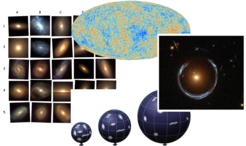Girls as researchers

The Girls’ Day 2018 at the MPA was a little different than in previous years: the 20 girls received not only an insight into the work at a theoretical scientific institute but became young researchers themselves. Tasks ranged from stars and galaxies, the gravitational lensing effect, to the expansion of the universe, and the cosmic microwave background. Autonomous, but with the help of local experts, the girls had to collect further information and data, classify it and perform calculations. Finally, they presented their results to the other groups in a short presentation. On enquiry, some girls stated that they could well imagine a career in astrophysics - even if they found the research tasks pretty difficult and mathematical. Still, their interest in the topic was by no means reduced!
The activities were not only instructive for the girls but also for the supervisors, who realised in the discussions with the groups that theoretical astrophysics strongly depends on mathematics and that it is a great challenge to explain astronomical facts descriptively, without difficult physical formulas. Homework for the scientists: by next year the projects need to be revised to contain more descriptive tasks and less mathematics.
In addition to the research task other typical activities in a scientist's workday were part of the programme. A common science coffee, for example, offered opportunities for discussion, students presented their work or astrophysical topics in short lectures, and as a special treat, the girls were taken on a journey to the beginning of the universe in the MPA planetarium.
